A version of this story first appeared in CNN Business’ Before the Bell newsletter. Not a subscriber? You can sign up right here.
Central banks were the superheroes of the early phase of the pandemic, taking dramatic steps to save the economy and financial markets from ruin.
Now, as the recovery kicks into gear, they’ve become a major risk for investors.
What’s happening: The latest reading of the Back-to-Normal Index from CNN Business shows that the US economy’s comeback is 90% complete. But investors are increasingly worried that the Federal Reserve, observing such promising data and rising inflation, will make a damaging mistake, such as moving too soon to roll back unprecedented levels of support — or ignoring growing problems until they’re too late.
In a Deutsche Bank survey of 620 market professionals published this week, 39% of respondents listed a “central bank policy error” as one of the top three risks to market stability, up from 21% the previous month.
Similar fears are reflected in the survey of global fund managers posted by Bank of America last week. The number two risk, behind inflation, is a “taper tantrum,” referring to a scenario where central banks ease up on bond purchases, increasing yields and sparking a panic in markets.
Big picture: Investors have become hooked on easy money from central banks like the Fed, whose decision to slash interest rates to rock bottom and buy up hundreds of billions of dollars in bonds fed the market’s rapid rebound after the initial coronavirus shock.
But such policies have also handed central banks huge power to dictate market outcomes, making it harder for them to pivot down the line.
See here: The Fed’s balance sheet increased to $7.4 trillion last year, the highest level on record, according to a new report from the Federal Reserve Bank of New York. By 2023, it could grow to $9 trillion, it projects. That’s almost as much as the combined annual GDP of Japan and Germany — and means policymakers can’t afford to make a mistake.
After a long holding pattern, central banks are “waking up” to the risk of a “consequential financial accident,” Mohamed El-Erian, an adviser to Allianz and Gramercy, wrote Tuesday in an op-ed for the Financial Times. But they’re in a difficult position, he added.
For now, the Fed continues to hold firm its stance that it’s monitoring risks but does not intend to take near-term action, even as prices rise.
“There are reasons why we should be seeing higher price levels today,” Atlanta Fed President Raphael Bostic said Monday. “The question is how enduring is it going to be. Right now, I am not seeing it is going to be enduring.”
The European Central Bank is sounding slightly more cautious. Last week, it warned that while “the economy is still reliant upon policy support to prevent widespread unemployment, corporate insolvencies and economic contraction,” financial markets have “exhibited remarkable exuberance.”
El-Erian thinks that investors “should be encouraging the Fed to pivot rather than just focus on the continued joy of surfing the liquidity wave.” But breaking an addiction is easier said than done, even as the potential for negative complications add up.
Apple and Epic Games await a blockbuster verdict
A weeks-long antitrust trial between Apple (AAPL) and Epic Games culminated with the maker of the hit video game Fortnite calling Apple (AAPL) an “overlord” and the iPhone maker suggesting Epic is paving the way for a “scary” future for iOS customers.
After spending days presenting reams of dueling economic analysis and documentary evidence, the two sides landed on Monday where they began: arguing over how Judge Yvonne Gonzalez Rogers should interpret Apple’s role in a sprawling digital economy, my CNN Business colleagues Brian Fung and Rishi Iyengar report.
Remember: The outcome of that analysis could reshape how digital app stores work or uphold Apple’s prime position in its app ecosystem.
What comes next: Gonzalez Rogers is set to decide whether Apple is an agile innovator that reaped just rewards for building a popular app business, or if it is, as Epic alleges, a monopolist that uses its control over the iOS App Store to illegally harm competition, restrict innovation and keep prices high.
The judge said Monday she aims to issue an opinion by mid-August, though it could take longer given the thousands of pages generated by the case.
Reading the tea leaves: Gonzalez Rogers offered critical questions to both sides. She challenged Apple on the fees it charges developers, and at times implied she was open to finding that Apple had broken the law. But she also pushed hard against Epic on Monday, suggesting that what the company was asking her to do was to “change the business model” of Apple.
Investor insight: Nick Rodelli, head of Legal Edge Research at CFRA, told clients that he thinks Epic “has a slight edge in winning the Apple litigation.” That could deal a major blow to Apple’s stock, given that App Store practices contribute a significant share of its pre-tax income.
Congress is skeptical of the SPAC boom
Are everyday investors getting duped by SPACs, one of Wall Street’s hottest trends over the past year?
That’s the growing concern in Washington. On Monday, lawmakers held a hearing to scrutinize whether more protections are needed now that billions of dollars have been allocated to special-purpose acquisition companies, which raise funding and then hunt for promising companies to take public. Startups including space venture Virgin Galactic (SPCE) and electric vehicle companies Lordstown Motors and Arrival have opted to merge with SPACs instead of pursuing traditional initial public offerings.
Reading the mood: “I have deep concerns about the lack of transparency and accountability that is a hallmark of the SPAC process,” Rep. Maxine Waters, the chair of the House Financial Services Committee, said in her opening statement.
One fear: SPACs have more leeway to make ambitious projections for future growth — and retail investors are “buying into this kind of hype,” testified Andrew Park, senior policy analyst at Americans for Financial Reform.
“Whereas in an IPO, issuers and underwriters are liable for making false and misleading forward looking statements, SPACs are not subject to that same standard,” Park said. “That has emboldened many pre-revenue companies in highly speculative industries such as electric vehicles, cryptocurrency, and space exploration to make what might generously be called very rosy projections.”
That could change. The House is looking at legislation that would alter how such rules apply to SPACs. The Securities and Exchange Commission could do the same. Does this spell the beginning of the end of the SPAC boom?
Up next
AutoZone (AZO) reports results before US markets open. Nordstrom (JWN) and Urban Outfitters (URBN) follow after the close.
Also today: New US home sales for April and consumer confidence data for May post at 10 a.m. ET.
Coming tomorrow: Earnings from Abercrombie & Fitch (ANF), Dick’s Sporting Goods (DKS), American Eagle (AEO), Nvidia (NVDA) and Williams-Sonoma (WSM).























